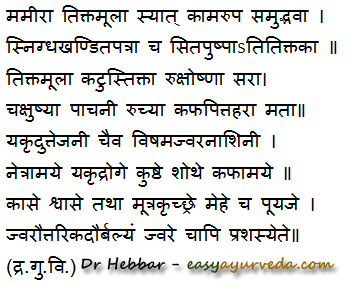Mamira – Thalictrum foliolosum Uses, Side Effects, Research
Mamira – Thalictrum foliolosum is useful in treating gastritis, dyspepsia, toothache, abdominal colic pain, haemorrhoids. It is also a known diuretic. It has been added to Ayurvedic pharmacopoeia very recently.
Botanical name – Thalictrum foliolosum DC (Coptis teeta)
Family- Ranunculaceae (Vatsanabha Kula)
Table of Contents
Vernacular names
English name- Gold thread Root
Hindi name- Pilijari
Urdu name- Mamiran
Bengali name- Guriani
Arabian name – Mammeeran
Assamese name – Mishmi Teeta
Sanskrit Synonyms
Tikta mula – Root is bitter in taste
Kamaru, Podbhava, Sita pushpa, Ati Tikatala
Distribution
Found in Assam and Chinese mountains. Chinese variety is considered as the best.
Major chemical constituents
Thalictrin (Magnoflorine) from rhizomes (J.Sci. Inda. Ras 1959)
Thalrugosidine, thalrugosaminine, thalisopine, Thilirugidine, oxyberberine,(berlabine) and noroxyhydrastinine isolated from roots(J.nat.prod. 1981., 44,45)
(Reference: Illustrated Dravyaguna VIjnana, Vol. II, by Dr JLN Shastry)
Mameera medicinal properties
Guna- Rooksha
Rasa (taste) – Tikta (bitter)
Vipaka- Katu – Undergoes pungent taste conversion after digestion
Veerya – Ushna – Hot potency
Effect on Tridosha – Balances Kapha and Pitta
Part used, dosage
Part used: Root, Rhizome
Dosage: 1-3 gram powder
Sanskrit verse

Medicinal uses
Thalictrum foliolosum Medicinal uses:
Chakshushya – useful in improving eye sight
Pachani – digestive
Ruchya – improves taste, useful in anorexia
Yakrut Uttejaka – stimulates liver
Vishamajwarahara – useful in recurrent fever
Netramaya – useful in eye disorders
Kushtahara – useful in skin diseases
Shothahara – relieves oedema, inflammation
Kasahara – relieves cough, cold
Shwasahara – useful in asthma, COPD and other respiratory diseases
Mutrakrichrahara – useful in dysuria
Puya Mehahara – useful in UTI, diabetes
Useful in debility following fever.
It is useful in treating gastritis, dyspepsia, toothache, abdominal colic pain, haemorrhoids
It has diuretic action.
External application
In conjunctivitis, its paste is applied over closed eyes.
Its paste is applied externally in leucoderma
Research
Alkaloids
Anti-bacterial activity
Side effects
There are no known side effects with this medicine.
It is safe to use in lactation and in children. Seek medical advice during pregnancy.
Interaction with medicines, supplements
Can this be used while taking Homeopathic medicine?
Yes. This product does not react with homeopathic medicine.
Can
this medicine be continued while taking supplements like multivitamin tablets,
Omega 3 fatty acids etc?
Yes. Generally, this product goes well with most
of the dietary supplements. However, if you are taking more than one product
per day, please consult your doctor for an opinion.
With western
medicines
Seek your
doctor’s advice if you are taking this product along with other western
(allopathic / modern) medicines. Some Ayurvedic herbs can interact with modern
medicine.
If both Ayurvedic and allopathic medicines are advised together, then it is
best to take Allopathic medicine first, wait for 30 minutes and then take the
Ayurvedic medicine.
Sthanika Karma
Externally – It has scraping action, Reduce swelling. Improve eyesight, External application of its paste is indicated in Netrabhishyantam (Conjunctivitis). Eyeliner can be made out of it is beneficial in diminished eyesight, corneal opacity. Also indicated in Vitiligo and in Kshudra roga (minor diseases)
Internally
Digestive system – It has a bitter taste and is hot in potency. It has carminative, digestive, and Anulomana (helps for the movement of doshas in the right direction) action. stimulate liver Indicated in constipation, loss of appetite, and in Jaundice.
Circulatory System – Indicated in Oedema
Respiratory System – Its bitter taste helps to pacify kapha dosha. Indicated in kasa (Cough) and breathing difficulties
Excretory system – Increase urine production, Indicated in difficulty in urination, UTI etc.satmikarana – Indicated in post viral fever body weakness
Tvak (Skin) – beneficial in skin diseases like vitiligo










